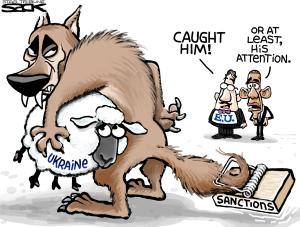The Cost of Sanctions
 In recent years, Iran’s pursuit of a nuclear weapons program and Russia’s aggressive takeover of Crimea, Georgia, and other disputed territories have provoked sanctions from the international community. Specifically, the United States and its allies have led efforts to impose restrictions on trade in energy and energy services with those countries in order to discourage them from what is seen as inappropriate or hostile behavior. While Iran has seen substantial economic harm as a result of the sanctions that have been placed upon its energy exports, it has only continued its nuclear program. Russia has not been deterred in annexing Crimea from Ukraine despite an international outcry and the imposition of sanctions preventing Westerners from working with Russia’s oil industry. Despite their inability to change state behavior, these sanctions have been incredibly costly for the targeted states and have imposed significant costs on many in the countries that have implemented them.
In recent years, Iran’s pursuit of a nuclear weapons program and Russia’s aggressive takeover of Crimea, Georgia, and other disputed territories have provoked sanctions from the international community. Specifically, the United States and its allies have led efforts to impose restrictions on trade in energy and energy services with those countries in order to discourage them from what is seen as inappropriate or hostile behavior. While Iran has seen substantial economic harm as a result of the sanctions that have been placed upon its energy exports, it has only continued its nuclear program. Russia has not been deterred in annexing Crimea from Ukraine despite an international outcry and the imposition of sanctions preventing Westerners from working with Russia’s oil industry. Despite their inability to change state behavior, these sanctions have been incredibly costly for the targeted states and have imposed significant costs on many in the countries that have implemented them.
The series of sanctions levied against Iran since its nuclear weapons program was discovered in 2002 has placed a heavy burden on the Iranian economy. As of May 2013, daily oil production had fallen by more than half; estimates suggested Iran had lost more than $26 billion in oil revenues over a two year period (representing more than a quarter of its 2011 total). Since oil revenues make possible about half of the Iranian government expenditures, Iran’s currency lost much of its value against the U.S. dollar and inflation hit more than 40%. As a result, Iran fell into a deep recession, with its GDP falling by 5.6% in 2012 and another 1.7% in 2013, according to IMF estimates.
Russia didn’t escape the pain of American and European sanctions either. Its largest banks were cut off from Western financing and the ruble has been sliding for months. While the central bank has sufficient reserves to maintain the currency for the immediate future if intervention becomes necessary, its access to dollars has been diminished both by the sanctions and by the lower price of oil. This may raise questions about its ability to support the ruble in the future if sanctions continue and the price of oil remains low.
The sanctions have not only affected Iran and Russia. American and European energy companies have long been involved in complex oil operations in both countries, especially in Russia’s Arctic deep-sea and shale oil projects. Petroleum engineers from the West have historically been better-trained, better-equipped, and more experienced in dealing with some of the most complicated oil formations thanks to diminished productivity and innovation during the Soviet era.
When the Soviet Union collapsed and the oil industry became privatized during the 1990s, Westerners saw an opportunity for investment and profitable technology transfer. The subsequent projects undertaken in Russia by Western supermajors have been some of the most difficult and complex in the world. They often involve extreme climates, undeveloped infrastructure, and remote locations.
Now, with sanctions aimed at reducing Russia’s oil production by halting American and European involvement, these projects may be derailed. According to a senior U.S. official, "Cutting off U.S. and E.U. sources of technology and services and goods for those projects makes it impossible, or at least extraordinarily difficult for these projects to continue...There are not ready substitutes elsewhere," He continued to say that “there’s no contract sanctity,” which may be more problematic for U.S. energy companies than it is for Russia. Western firms will be less likely to invest in regions of the world that they see as potential targets of future sanctions, which is of especially great concern due to the lengthy time commitment such projects entail.
In addition to the serious negative consequences for Western companies and investors, energy sanctions could undermine their own effectiveness if put in place for too long. Already Russia and Iran have struck a $20 billion deal to “cooperate in the oil-gas industry, construction of power plants, grids, supply of machinery, [and] consumer goods and agriculture products.” Russia and Iran will work together to transport and distribute oil and gas for the next five years. It is not difficult to imagine that, forced to work only with each other long enough, Russia and Iran will develop the requisite skills and technologies to fully utilize their own energy resources without the partnership of Western companies. If they are able to accomplish this goal, energy sanctions will be rendered redundant. Russia and Iran will simply export to non-Western markets. The West must think very carefully before allowing these sanctions to last, lest it lose one of its key tools for combating Russian and Iranian aggression forever.
